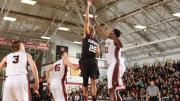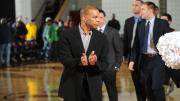Harvard Hardwood, the Harvard Magazine basketball report
Last Wednesday, Tommy Amaker, the Stemberg Family head coach of men’s basketball, sat on a leather couch in the glass-encased lounge overlooking Lavietes Pavilion with his arm stretched out and a grin on his face. He was preparing for home games against Yale and Brown that would determine whether the program would capture its fifth consecutive conference title and, potentially, a fourth straight NCAA tournament berth. But before discussing business, Amaker joked about the probability that Boston would break the record for winter snowfall.
Why was the coach so loose ahead of the season’s most pivotal moment?
It was strategic. With so much hoopla surrounding the weekend, Amaker was demonstrating to his players the need to stay calm. “I don’t think I have to emphasize to them the importance [of these games],” he said.
Amaker’s even-keeled approach paid dividends as he guided his team through a weekend he characterized as an “emotional rollercoaster.” It started with a 62-52 loss to Yale on Friday evening that allowed the Bulldogs to clinch at least a share of the Ivy title—and, more important, meant that if Yale won at Dartmouth on Saturday, Harvard’s hopes for another Ivy League title would end.
On Saturday, Harvard did its part by defeating Brown 72-62, and miraculously Yale—which had been up five points with 24 seconds left—fell to the Big Green 59-58 on a last-second basket. That result gave Harvard a share of the conference championship and means that the Crimson will square off with Yale next Saturday to determine who represents the Ancient Eight in the NCAA tournament. The question is which Crimson team will show up.
 Harvard Hardwood
Harvard Hardwood
Sign up for Harvard Magazine’s basketball e-mail and follow the Crimson all season long. David L. Tannenwald ’08 will provide the latest news, game summaries, and insights as the Crimson chase another Ivy title.
The Low Point
Amaker tried to downplay the significance of Friday’s game, but Yale’s team and the rest of the Harvard community did not. Shortly before tipoff, Justin Sears, the Bulldogs’ star forward, posted on Facebook that he came to Yale to get into Skull and Bones, one of the school’s elite secret societies (a dream that he acknowledged is “dead”), and “To Beat Harvard.”
Meanwhile, the Harvard Athletic Department welcomed ESPN broadcaster Michele Steele to campus to report on the big game for Sports Center, and also honored all three of the Crimson’s fall Ivy League champions—football, women’s soccer, and women’s volleyball. With those teams’ members turning out in force to celebrate, the student section overflowed into extra bleachers. The football squad, wearing matching crimson pullovers, stood courtside and began heckling Javier Duren, Yale’s other star player, during warm-ups. The sold-out crowd was as loud as any the Crimson has seen since the 2011 Ivy clincher against Princeton.
But Harvard’s hoopsters failed to harness the crowd’s energy. After a back-and-forth first half, the Bulldogs opened up a 12-point lead on a jumper from senior forward (and Rhodes Scholar) Matt Townsend with 12 minutes remaining. Harvard twice cut the deficit to four points, and once pulled within two, but the Bulldogs didn’t buckle. With 12 seconds left, and the Bulldogs ahead by eight, Yale coach James Jones hugged his assistants, signaling the victory was in hand.
Once again, the Crimson suffered from anemic outside shooting and poor focus. Harvard made just two of 17 three-point attempts, and Corbin Miller ’15 (’17)—the team’s best long-range marksman—missed all eight of his attempts from three-point range. The team’s lone offensive spark came from senior co-captain Steve Moundou-Missi, who tallied 21 points and 10 rebounds. Despite Amaker’s attempt to keep them grounded, the rest of the team struggled with the gravity of the moment. “We just let our emotions get too high,” lamented Wesley Saunders ’15, the reigning Ivy League Player of the Year, who scored 11 points for the game and just three points in the second half.
Meanwhile, the Bulldogs made their way to Hanover on their own high. Yale had clinched at least a share of its first conference title since 2002—and with a win at Dartmouth could capture an NCAA tournament berth for the first time since 1962. As Duren, who carved up the Crimson defense for a game-high 22 points, Tweeted after the game, “One. More.”
The Mid Point
Before Saturday’s game, Amaker shared with his players an adage he attributed to an earlier Harvard athlete, John F. Kennedy ’40, LL.D. ’56: “Never settle for second place when first place is still available.” The advice proved prescient.
After falling behind the Bears by as many as seven points in the first half, the Crimson pulled away from Brown in the second half with one of its most balanced offensive efforts of the season: Siyani Chambers ’16 led Harvard with 15 points, but Saunders, Kenyatta Smith ’15, and Jonah Travis ’15 tied for second with 12 points each.
Harvard’s offense also operated “inside-out,” something the coach has been calling for all year. On the interior, Smith, whom Amaker has gradually worked back into the lineup since the big man injured his knee against Boston College, scored on several jump hooks. Meanwhile, after his horrid shooting against Yale, Miller sank a pair of long balls, and Chambers nailed three of four three-point attempts, helping the team shoot 40 percent from behind the arc.
With the offense clicking, the Crimson went on a 17-1 run roughly halfway through the second half to break the game open. It was one of Harvard’s finest stretches all year. But as Amaker took his seniors—who lost just five times at Lavietes in their careers—off the floor and the crowd responded with a standing ovation, it was uncertain whether they would have the chance to build on that performance in a meaningful contest. The answer lay in Hanover.
A High Point
To accommodate CBS Sports Network, which was broadcasting the game, Harvard and Brown had tipped off at 6:00 p.m. Meanwhile, Yale and Dartmouth had begun playing at 7:00, the typical start time for Ivy contests. As a result, when the final buzzer sounded at Lavietes, fans, players, and coaches spread out across the athletic complex to monitor (or in some cases avoid) the game at Dartmouth, which Yale led by single digits late in the second half.
Amaker, and many players, retired to an adjoining building for a pizza party to honor the graduating seniors and watched the game on television. Meanwhile, a handful of fans and players—including Travis and freshman Andre Chatfield—monitored the game courtside. Matt Fraschilla ’17, an energetic back-up point guard, alternated between the courtside group and the glass-encased lounge overlooking the court, where a handful of reporters watched the game online.
For fans—regardless of their teams’ postseason fate—it was captivating basketball. Yale had a five-point lead with 24 seconds left, but Dartmouth sank a three and a pair of free throws to knot the score at 57. Then, with Yale ahead by one and less than two seconds remaining, Dartmouth senior Gabas Maldunas scored on an inbounds play to give the Big Green the win. After the game, the highly touted Lithuanian big man directed a concise Tweet to the Harvard team: “you’re welcome.”
Back at Lavietes, several players dove and piled on top of each other at center court. Fraschilla ran upstairs and yelled, “Rematch!” And one attendee at the reception reported that even the even-keeled Amaker went “crazy” when the game concluded.
Apex?
Where will this team crest?
The Crimson can take comfort in the fact that amid all of this season’s peaks and valleys, they have improved. Moundou-Missi is a case in point. The senior power forward scored in double figures in just two of the team’s first 10 games, but he scored 12 or more points in seven of the team’s final eight contests. The same can be said of Smith, who looked as good as he has all year against Brown. Paired with Travis, those players can give the Crimson the interior presence that their coach’s inside-out offense demands. That would make the Crimson a threat to beat Yale and, in a best-case scenario, continue the team’s recent string of victories in the NCAA tournament.
On the other hand, the team’s disjointed offensive display against Yale was a reminder of just how much the Crimson has struggled during much of the season. Even with a strong interior presence, Harvard’s offense relies on strong outside shooters; if Miller and his teammates cannot make outside shots, they will find it difficult to beat the Bulldogs, let alone win a game (or two) in the tournament.
Harvard will answer these questions next Saturday when they take on Yale at the Palestra, in Philadelphia.
Tidbits
- The women’s basketball team defeated Yale 68-63 on Friday night and overcame Brown 76-69 on Saturday. Junior AnnMarie Healey set a career high with 24 points to help the Crimson take down the Bulldogs. Against the Bears, senior Temi Fagbenle led the way with 16 points and 18 rebounds, giving her 13 double-doubles this season. With the victories, the Harvard women concluded their season at 14-14 overall and 7-7 in league play.










